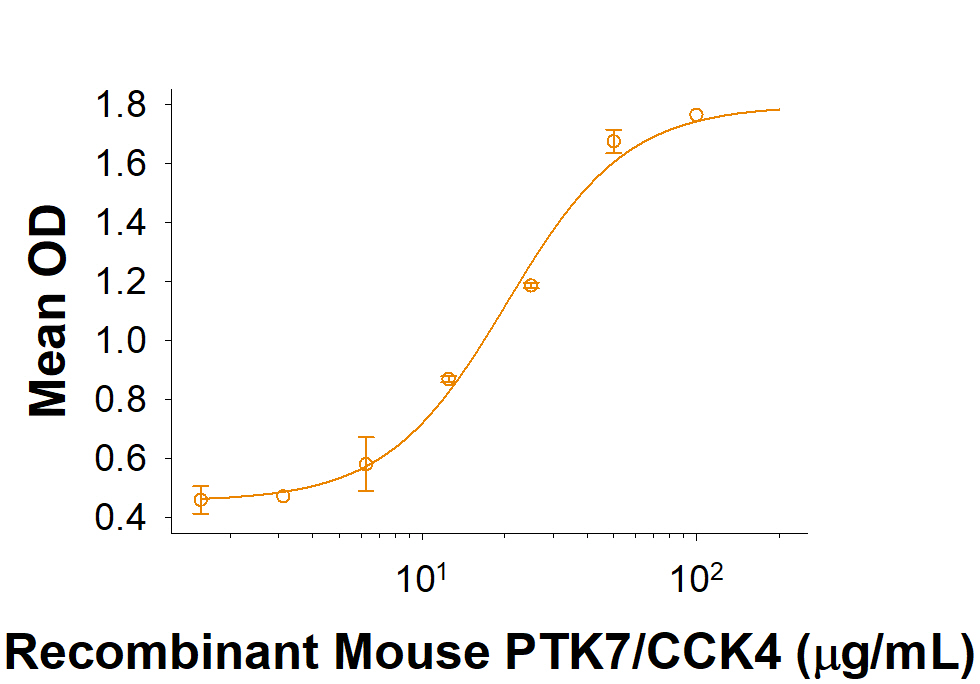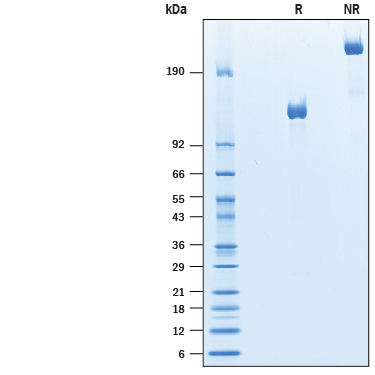Recombinant Mouse PTK7/CCK4 Fc Chimera Protein, CF Summary
Product Specifications
| Mouse PTK7/CCK4 (Ala23-Thr696) Accession # Q8BKG3 | IEGRMDP | Mouse IgG2A (Glu98-Lys330) |
| N-terminus | C-terminus | |
Analysis
Product Datasheets
Carrier Free
CF stands for Carrier Free (CF). We typically add Bovine Serum Albumin (BSA) as a carrier protein to our recombinant proteins. Adding a carrier protein enhances protein stability, increases shelf-life, and allows the recombinant protein to be stored at a more dilute concentration. The carrier free version does not contain BSA.
In general, we advise purchasing the recombinant protein with BSA for use in cell or tissue culture, or as an ELISA standard. In contrast, the carrier free protein is recommended for applications, in which the presence of BSA could interfere.
10333-TK
| Formulation | Lyophilized from a 0.2 μm filtered solution in PBS with Trehalose. |
| Reconstitution | Reconstitute at 500 μg/mL in PBS. |
| Shipping | The product is shipped at ambient temperature. Upon receipt, store it immediately at the temperature recommended below. |
| Stability & Storage: | Use a manual defrost freezer and avoid repeated freeze-thaw cycles.
|
Scientific Data
 View Larger
View Larger
Recombinant Mouse PTK7/CCK4 Fc Chimera (Catalog # 10333-TK) binds Biotinylated Recombinant Mouse Wnt-3a (Catalog # BT1324). The ED50 for this effect is 8-48 µg/mL.
 View Larger
View Larger
2 μg/lane of Recombinant Mouse PTK7/CCK4 Fc Chimera (Catalog # 10333-TK) was resolved with SDS-PAGE under reducing (R) and non-reducing (NR) conditions and visualized by Coomassie® Blue staining, showing bands at 110-130 kDa and 220-160 kDa, respectively.
Reconstitution Calculator
Background: PTK7/CCK4
Protein tyrosine kinase 7 (PTK7), also known as colon carcinoma kinase 4 (CCK4), is a member of the receptor tyrosine kinase superfamily (1, 2). PTK7 is a type I transmembrane receptor with a large extracellular domain (ECD) containing 7 Ig-like C2 type loops, a transmembrane domain, and a cytoplasmic tyrosine kinase homology domain. However, due to the lack of the DFG triplet motif required for catalytic activity in the kinase domain, PTK7 is considered a pseudokinase (1, 3). The mature ECD of mouse PTK7 shares 92% amino acid sequence identity with human PTK7. PTK7 is expressed in a wide array of tissue types ranging from lung and liver to kidney and placenta and has been linked to a broad range of functions (5). While originally identified as being over-expressed in colon carcinomas, PTK7 has been shown to play a role in embryogenesis, epithelial tissue organization, angiogenesis, cell motility, and survival (1, 6, 7). PTK7 has been shown to be an important regulator of the Wnt signaling pathways, both canonical and non-canonical, and is linked to the regulation of the planar cell polarity pathway (3, 6). Proteolysis of full-length PTK7 by MMPs (matrix metalloproteinases), ADAMs (a disintegrin domain and metalloproteinases), and gamma-secretases results in a soluble N-terminal fragment and several C-terminal, membrane-associated or intracellular proteolytic fragments (3, 6). The soluble form is a co-receptor for the Semaphorin/Plexin and VEGF signaling pathways (8). Deregulation of PTK7 signaling has now been observed in numerous cancers including colon, gastric, lung, and acute myeloid leukemia (1, 3). Recent studies have shown that PTK7 expression promoted increased migration and resistance to apoptosis in leukemic cells and acute myeloid leukemia (AML) blasts, while knock-down of PTK7 induced apoptosis in colorectal carcinoma cells (2, 7). Further, other studies have suggested that the ratio of full-length vs. cleaved protein, not just expression, contributes to PTK7's metastatic effects in cancer (6).
- Shin, W. et al. (2008) Biochem. Bioph. Res. Co. 371:793.
- Meng, L. et al. (2010) PLoS ONE 5:e14018.
- Golubkov, V. et al. (2010) J. Biol. Chem. 285:35740.
- Berger, H. et al. (2017) Front. Cell Dev. Biol. 5:31.
- Park, S. et al. (1996) J. Biochem. 119:235.
- Golubkov, V. et al. (2014) J. Biol. Chem. 289:24238.
- Prebet, T. et al. (2010) Blood. 116:2315.
- Peradziryi, H. et al. (2012) Arch. Biochem. Biophys. 524:71.
FAQs
No product specific FAQs exist for this product, however you may
View all Proteins and Enzyme FAQsReviews for Recombinant Mouse PTK7/CCK4 Fc Chimera Protein, CF
There are currently no reviews for this product. Be the first to review Recombinant Mouse PTK7/CCK4 Fc Chimera Protein, CF and earn rewards!
Have you used Recombinant Mouse PTK7/CCK4 Fc Chimera Protein, CF?
Submit a review and receive an Amazon gift card.
$25/€18/£15/$25CAN/¥75 Yuan/¥2500 Yen for a review with an image
$10/€7/£6/$10 CAD/¥70 Yuan/¥1110 Yen for a review without an image
